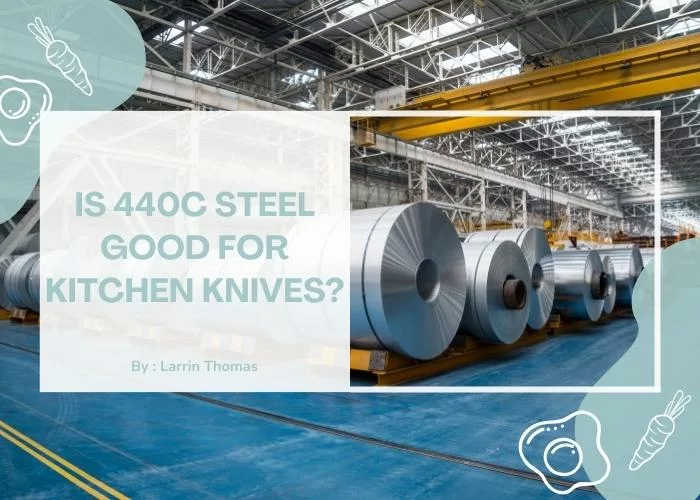The 440c steel is made of a high-carbon stainless steel alloy that is both hard and strong. The high carbon content (compared to other stainless steels) makes the alloy hard and resistant to wear, while the chromium makes it resistant to corrosion. Because of this mix of qualities, 440c steel is great for making mid-range knife blades and other cutting tools.
This article talks about what 440c steel is made of, what its properties are, and how it can be used. You’ll also find out what makes this alloy good and what makes it worse as we compare it to other types of steel.
What is 440c steel?
440c is an alloy of stainless steel with a lot of carbon. It is part of the 440 series. It has the most carbon of all the steels in its series, which gives it its hardness, strength, and resistance to wear. The steel is good for knife blades and other mid-range cutting tools because it doesn’t rust too much.
The 440A, 440B, and 440F are other types of steel in the 440 series. When heat-treated and tempered in the right way, this series of steel is the hardest. They also have chromium, which is an important part that keeps the steel from rusting and corroding.
Chemical composition of 440c steel
The unique properties of 440c steel come from the way it is made chemically. Here are the percentages of the chemicals that make up the alloy:
- Carbon 1.10%: Carbon is the main element in 440c steel that makes it hard. It also makes the material last longer.
- Chromium 17%: Chromium makes sure that steel doesn’t rust or corrode. It also keeps the alloy from breaking and makes it stronger.
- Manganese 0.8%: Manganese helps martensite form, which is the phase you want in heat treatment. It also makes the steel tougher, increases its tensile strength, and makes it less fragile.
- Molybdenum 0.70%: Molybdenum makes the steel easier to work with. It also makes the steel stronger and more durable.
- Silicon 0.50%: Silicon makes steel harder and stronger, but not as much as carbon or manganese.
- Phosphorus 0.20%: Phosphorus makes steel stronger, less likely to rust, and easier to work with machines.
- Sulfur 0.02%: Sulfur is a minor alloying element, but it works with phosphorus to make the metal easier to machine.
- Iron 79.50%: Iron is the most important part of the alloy. It gives the steel its bendability and ability to be shaped.
Is 440c steel good as a knife material?
440c steel is a unique alloy because of how its chemicals make it up. This steel is good for knife blades because of a number of things. When looking for a material for a knife blade, you want one with a good balance of hardness and resistance to rust.
From the above list of chemicals, it’s clear that the 440c has a lot of carbon in it. The right amount of carbon is what makes steel hard and resistant to wear. Also, the 17% chromium makes it resistant to corrosion. The steel also has the right amounts of manganese, molybdenum, and silicon to have the properties that were wanted.
Here’s a more in-depth look at what 440c steel has to offer:
Hardness
On the Rockwell scale, 440c steel is 58–60, which means it is pretty hard. Because it has a lot of carbon, steel can be made to be very hard. It is not as hard as some other types of modern steel, but it is the hardest of the 440 series.
Steel is great for knife blades because it is so hard. Between 58 and 60 HRC is the range of hardness that is used to make pocket knives.
Edge retention
Edge retention is the ability of the steel to keep its edge after being used over and over. The 440c steel holds an edge well and can take a lot of wear before it needs to be sharpened. Because carbon and chromium work together, steel has a high resistance to wear.
Wear resistance
Because it has carbon and chromium in it, 440c has a high resistance to wear. The 440c steel blade won’t wear down for a long time. The 440c steel is great for chefs and other people who need a knife that can be used over and over again.
Corrosion resistance
The 17% chromium content makes it very resistant to corrosion in any environment. Steel is great for knife blades because it doesn’t rust or corrode easily. A knife with good to moderate corrosion resistance is easy to take care of and won’t rust or corrode over time.
Ease of Sharpening
The steel is hard, which makes it hard to sharpen. The 440c steel, like the rest of the 440 series, is not as easy to sharpen as softer steels. Also, unlike some other high-carbon steels, it doesn’t get too sharp. But it can keep its sharpness for a long time.
Toughness
For something to be resistant to corrosion and wear, its toughness has to go down. The 440c steel is not as tough as steel with less carbon, but it is still tougher than other high-carbon steel. Steel is still strong enough to make knife blades that won’t break easily.
Benefits and drawbacks of 440c steel
In summary, here are some of the pros and cons of 440c steel:
Benefits:
- Excellent hardness for knife blades
- Good edge retention
- High wear resistance
- Excellent corrosion resistance
- Easy to maintain
Drawbacks:
- Hard to sharpen
- Limited toughness
440c steel vs. other stainless steel alloys
When 440c steel is compared to other stainless steel alloys, it is clear that it is a unique alloy. But in one area, other types of steel alloys might be better.
Here’s how the alloy stacks up against other types of stainless steel alloys:
- S30V: Steel made from powder, S30V is much harder than 440c. It also keeps its edge longer and is tougher, but it’s harder to sharpen. Both alloys are resistant to corrosion because they have almost the same amount of chromium in them.
- D2 steel is a top-of-the-line type of steel that keeps its edge longer and is tougher than 440c. The high chromium content of 440c, on the other hand, makes it less likely to rust. Also, D2 is harder to sharpen than 440c.
- VG10: VG10 is a common steel alloy that keeps its edge better than 440c. The 440c, on the other hand, is less likely to rust and is easier to sharpen. It is also stronger than VG10 and resists corrosion almost as well as VG10.
FAQs
Is 440c material good?
Grade 440C stainless steel is martensitic stainless steel with a lot of carbon in it. Compared to other types of stainless steel, it stands out as an alloy that can stand up to wear and corrosion very well. 440C is one of the most popular stainless steels, used primarily for its excellent corrosion resistance and high hardness. Many consider it to be ideal for knife making because of these qualities.
Does 440c rust?
440c stainless steel doesn’t resist rust and corrosion as well as other types of steel. It’s easier to keep up than carbon steel, but it doesn’t resist rust as well as other stainless steel alloys do. The high amounts of chromium and carbon in 440c make the alloy more resistant to rust and corrosion.
Is 440c stainless steel magnetic?
Magnets can stick to 440c stainless steel. The steel has enough magnets in it to make a magnetic field that can be felt.
Final Verdict
Because of how it is made and what it can do, 440c steel is often used to make knife blades and other cutting tools. It is very hard, doesn’t wear down easily, and doesn’t corrode. It is also easy to sharpen and keep in good shape. Even though 440c steel may not be the best in every way, it is still the best choice for many uses.

